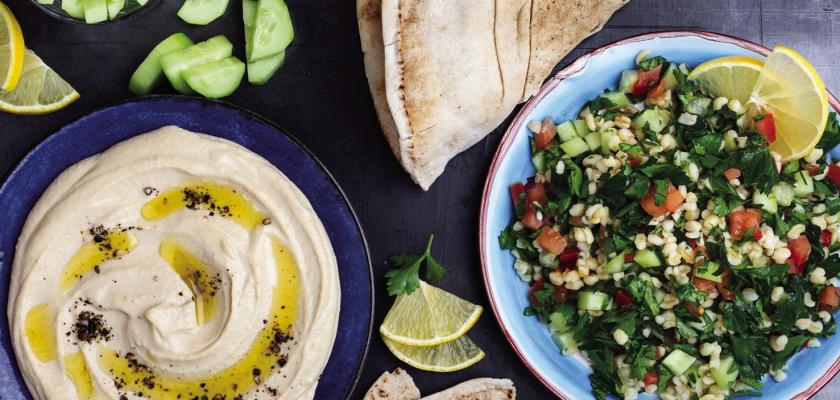Mediterranean for Mental Health
Most of us eat better if we’re in a better state of mind. The relationship between nutrition and mental health is the subject of a growing number of studies.
For example, recent studies have identified benefits in helping reduce depression for those who eat according to the Mediterranean diet pattern. A 2019 review published in The American Journal of Clinical Nutrition found that just increasing fruit and vegetable consumption positively impacts psychological health, and daily vegetable consumption has a therapeutic impact by reducing symptoms of depression in people with clinical depression. Why? A healthy diet provides more vitamins and minerals; healthy fats; and fiber from fruits, vegetables, whole grains, nuts and seeds, which can reduce inflammation and alter neurotransmitters to reduce symptoms of depression.
More recently, an April 2022 study published in Current Developments in Nutrition assessed the effect of the Mediterranean diet pattern in treating moderate to severe depression among males ages 18 to 25. The basics of the pattern are more fruits, vegetables, fish, whole grains and healthy fats such as olive oil.
Study participants had all been diagnosed with major depressive disorder and were divided into a diet intervention group and a control group for a 12-week, parallelgroup randomized controlled trial. The diet intervention group received nutritional counseling and assistance in meal planning to adhere to the Mediterranean diet pattern. They attended a 60-minute nutritional counseling appointment conducted by a clinical nutritionist who offered personalized dietary advice, goal setting and mindful eating strategies to support adherence to the Mediterranean diet. They also were provided information on serving sizes, sample meal plans, recipes, dining-out options and a daily online diet history survey. In contrast, participants in the control group attended “befriending” support sessions in which researchers discussed neutral topics of interest such as movies, sports, and hobbies. Befriending support was chosen for its ability to control factors that can confound randomized controlled trial results.
Researchers found the diet intervention group showed significant improvements in depressive symptoms, with a mean reduction of 20.6 points on the Beck Depression Inventory Scale, compared with a reduction of 6.2 points for the control group.
The bottom line? Eating healthy according to the Mediterranean diet pattern can make a difference in your mental health as well as your physical health.
Q and A
Q: Does eating a larger meal in the morning help with weight loss?
A: Researchers aren’t sure. A randomized crossover trial was conducted with 30 people enrolled who were either overweight or obese. For four weeks, the subjects ate a calorie-restricted diet with the highest calorie meal in the morning. For the next four weeks, they consumed the same number of calories with the highest calorie meal in the evening. The larger morning meal did not lead to greater weight loss over four weeks, but participants did report significantly lower hunger on the bigger breakfast days. Researchers concluded that eating more of one’s calories in the morning might help control overall calorie intake in the long term. More research -- and a larger number of participants -- is needed.
RECIPE
As the days heat up, many start thinking about salads, exchanging the slow cooker soups and stews for fresh finds at the local market. Here’s a recipe for a Southwest- inspired Chili-Rubbed Flank Steak Salad.
CHILI-RUBBED FLANK STEAK SALAD Servings: 4 1 pound flank steak, trimmed 2 tablespoons avocado oil or canola oil 1 clove garlic, minced 1 tablespoon chili powder 1 teaspoon unsweetened cocoa powder 1 teaspoon ground cumin 1/2 teaspoon ground cinnamon 1/2 teaspoon ground pepper 1/4 teaspoon kosher salt DRESSING
1/4 cup loosely packed fresh cilantro, finely chopped 1/4 cup low-fat plain Greek yogurt 2 tablespoons mayonnaise 1 teaspoon lime zest 2 tablespoons lime juice 1 clove garlic, minced 1 teaspoon honey 1/8 teaspoon kosher salt SALAD
6 cups chopped romaine lettuce 1 cup frozen corn kernels, thawed One 15-ounce can low-sodium black beans, rinsed 1 large orange or yellow bell pepper, thinly sliced 1/2 medium red onion, thinly sliced 1/4 cup crumbled feta cheese 1/4 cup chopped fresh cilantro 2 tablespoons pepitas To prepare steak & rub: Place steak in large glass dish. In small bowl, combine oil, garlic, chili powder, cocoa, cumin, cinnamon, pepper and 1/4 teaspoon kosher salt. Rub mixture on both sides of steak. Cover and refrigerate for 1 1/2 to 2 hours.
Meanwhile, prepare dressing: In separate small bowl, whisk cilantro, yogurt, mayonnaise, lime zest, lime juice, garlic, honey and salt.
To cook steak: Preheat grill to medium-high. Clean and oil grates. Grill steak to desired doneness, 4 to 5 minutes per side for mediumrare (130-135 degrees F on instant-read thermometer). Transfer to clean cutting board and let rest 4 to 5 minutes before slicing.
To prepare salad: In large bowl, combine lettuce, corn, beans, bell pepper and onion. Add dressing and toss to coat. Slice steak thinly across the grain. Divide salad among 4 plates, top with steak and sprinkle with feta, cilantro and pepitas, if using.
Per serving: 467 calories, 36 g protein, 32 g carbohydrate, 22 g fat (5 g saturated), 83 mg cholesterol, 9 g fiber, 7 g sugars, 538 mg sodium.
(Recipe from Eating Well)
Charlyn Fargo is a registered dietitian with SIU Med School in Springfield, Illinois. For comments or questions, contact her at charfarg@aol. com or follow her on Twitter @ NutritionRD. To find out more about Charlyn Fargo and read features by other Creators writers and cartoonists, visit the Creators website at www.creators.
com.


